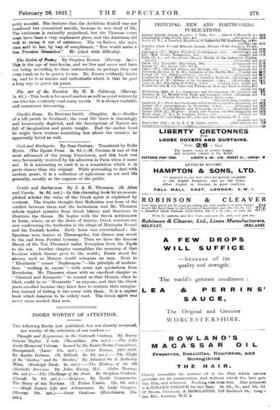Greeks and Barbarians. By J. A. K. Thomson. (1 Allen
and Unwin. 8s. 8d. net.)—In this charming book by an accom- plished scholar the value of the Greek spirit is explained by contrast. The Greeks thought that Hellenism was born of the conflict between them and the barbarians, and Mr. Thomson selects typical episodes from Greek history and literature to illustrate the theme. He begins with the Greek settlements in Ionia, where, as at the dawn of history, Greek warriors are now confronting the barbarian in the shape of Mustapha Kemal and his Turkish hordes. Early Ionia was overwhelmed ; the Spartans were beaten at Thermopylae, but Greece was saved in the end from Persian tyranny. Then we have the famous March of the Ten Thousand under Xenophon from the Tigris to .the sea. Another chapter exemplifies the meaning of that freedom which Greece gave to the world ; Persia stood for slavery such as Moscow would reimpose on men. Next to " Eleuthetia " comes " Sophrosyne "—the principle of modera- tion, " nothing in excess "—with some apt quotations from Herodotus. Mr. Thomson closes with an excellent chapter on " Classical and Romantic " to remind us that Homer, when he liked, could be as " Romantic " as anyone, and that the Greek poets excelled because they knew how to restrain their imagina- tion instead of letting it run away with them. It is a capital book which deserves to be widely read. The Greek spirit was never more needed than now.


































 Previous page
Previous page